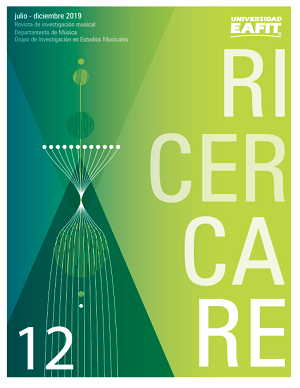Open concert. Analysis of the existing variables in the construction process of a lyric singing degree recital
Main Article Content
Keywords
Staging, degree recital, artistic creation, audience, effective connection
Abstract
: The main object of the following article is to methodologically narrate the process through which my recital degree was constructed starting with the question: how does one make a lyrical singing recital degree inviting and interesting for the audience? The question arose mainly because my interest resided in keeping the inexperienced audience's attention during the whole concert. In order to accomplish this, I began with the analysis of previous recitals, obtaining a series of structural elements that were later altered in search of creating a coherent and integral staging capable of maintaining the audience's attention and whose results could be quantitatively and qualitatively analyzed.
Downloads
References
Antoniou, P. [Netflix]. (2017). Abstracto: el arte del diseño. Capítulo 7
[Archivo de video]. Documental de Netflix.
Bjork. [Zombinella] (30 de marzo de 2016). Bjork biophilia [Archivo de video].
Recuperado de https://www.youtube.com/watch?v=vfE7jsCycAM&t=675s
Devlin, E. [Netflix]. (2017). Abstracto: el arte del diseño. Capítulo 3
[Archivo de video]. Documental de Netflix.
Eliasson, O. (2012). Leer es respirar, es devenir: escritos de Olafur Eliasson. Barcelona: Gustavo Gili.
Foletto, A. (2012). Svoboda rispescato da Macbeth. Recuperado de https://ricerca.repubblica.it/repubblica/archivio/repubblica/2012/11/11/svoboda-rispescato-da-macbeth.html?refresh_ce
García, G. (2019). ¿Cuál es la importancia del arte en la sociedad? Recuperado de https://www.artescondido.com/cual-es-la-importancia-del-arte
Gutiérrez, P. (2006). Arte vs Entretenimiento. Recuperado de http://www.
zonanegativa.com/arte-vs-entretenimiento/
Howard, P. (2002). What is Scenography? London and New York: Routledge.
Lamberti, F. (2015). Las tecnologías del entretenimiento: pasado, presente y futuro. Recuperado de https://www.computer.org/publications/tech-news/computing-now/entertainment-technologies-past-present-and-future-trends-spanish-version
McKinney, J. (2008). The Nature of Communication between Scenography and its Audiences (Tesis de doctorado). School of Performance and Cultural Studies, University of Leeds.
Pérez, Á. L. (2018). Wagner y Gesamtkunstwerk: concepto de obra de arte total. Definición e interpretación en otras artes. Publicaciones didácticas, (93), 356-361. Recuperado de https://www.semanticscholar.org/paper/Wagner-y-Gesamtkunstwerk%3A-concepto-de-obra-de-arte-Garrido-Luis/0e05041766d887e7ea662a3b28d441f7178669aa
Purcell, C. (2009). Higiene de estudio para niños, adolescentes y adultos. Recuperado de http://www.ceciliapurcell.cl/articulo01.html
Scher, P. [Netflix]. (2017). Abstracto: el arte del diseño. Capítulo 6
[Archivo de video]. Documental de Netflix.
Subirana, R. [Roger Subirana]. (14 de mayo de 2019). Symbiphonic - Excerpts (Cinema Live Concert 3D Mapping Show) [Archivo de video]. Recuperado de https://www.youtube.com/watch?v=NpOrBbudDIY
Ubersfeld, A. (1982). The Pleasure of the Spectator. Toronto: Modern Drama.

